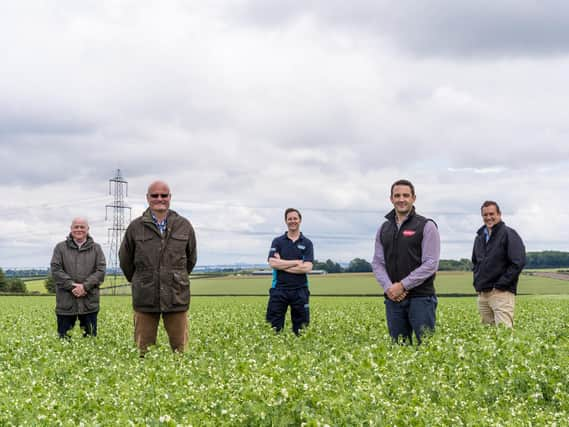Farmers in East Yorkshire working with Yorkshire Water, Birds Eye and Future Food Solutions are using 'pop up rainforests' to help with climate change


The Sustainable Landscapes Humber Project, which is involving more than 40 farmers, Yorkshire Water, the Birds Eye food firm and a supply chain consultancy, Future Food Solutions, is looking at using cover crops to help capture carbon from the atmosphere, improve soil structure and its ability to hold water.
Cover crops are plants grown to cover the soil rather than to be harvested.
Advertisement
Hide AdAdvertisement
Hide AdBased in the Yorkshire Water catchment area, the farmers, who all grow peas for Nomad Foods-owned Birds Eye, are planting the crops in the gap between harvesting peas and sowing for the next batch.
Andrew Walker, Asset Strategy Manager for Yorkshire Water, said the Sustainable Landscapes Humber Project laid the foundations for addressing some of the most urgent problems the world is currently facing.
He said: “Growing cover crops to increase soil organic matter is one of the most effective ways of combating the major environmental issues we face today.
“In just seven weeks, they generate enough carbon-sequestering organic material to make a significant dent in atmospheric CO2.”
Advertisement
Hide AdAdvertisement
Hide AdHe added that the Sustainable Landscapes Humber Project could also potentially play a major role in the reduction of flooding in Hull.
“Research shows that achieving just a one per cent increase in soil organic matter would enable agricultural land to store an extra 200,000 litres of water per hectare. Therefore, this project has huge implications for flood attenuation in and around Hull.”
Steve Cann and Paul Rhodes, from Market Weighton-based Future Food Solutions, likened the crops, which are made up of a diverse range of plants chosen for their ability to capture carbon from the atmosphere which is then locked in around the root, to a “pop-up rainforest”.
The crop is cut and left on the land which adds more organic matter to the soil, making it a more effective carbon sink.
Advertisement
Hide AdAdvertisement
Hide AdTrials for the project, which is being funded by Yorkshire Water and overseen by the UK Birds Eye Agricultural Team, have reportedly shown that growing cover crops can increase soil organic matter by up to 40 tonnes per hectare, which can remove more than four tonnes of atmospheric carbon each year.
Former farmer Mr Rhodes said growing cover crops has implications for soil health and the environment.
He added: “The plants’ root structure holds the topsoil in place reducing erosion and the increase in organic matter means less farm inputs are required, enabling farmers to grow food
more efficiently and profitably.”
Mr Cann described the Sustainable Landscapes Humber Project as a great example of collaboration and stressed that it has the potential to be rolled out further across the country.
Advertisement
Hide AdAdvertisement
Hide AdHe said: “The same farmers will grow wheat, barley and oil seed rape for other supply chain partners, so the potential to upscale the project is huge.
“As further crops come into play, we expect to see more food brands coming on board and more farmers starting to grow cover crops as the benefits become clear.”
Comment Guidelines
National World encourages reader discussion on our stories. User feedback, insights and back-and-forth exchanges add a rich layer of context to reporting. Please review our Community Guidelines before commenting.